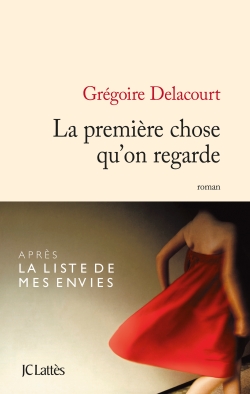July 9, 2014
Scarlett Johansson sues author for writing about a Scarlett Johansson look-alike — and wins
by Julia Fleischaker

The woman on this cover is not, I repeat, NOT, Scarlett Johansson.
Image via http://www.editions-jclattes.fr/
Scarlett Johansson brought a lawsuit against Grégoire Delacourt for using her likeness in his novel, La première chose qu’on regard (roughly translated as “The first thing we look at.”), and was awarded a monetary reward from the French court. Because Delacourt’s book used Johansson as an archetype of physical beauty, he thought she would enjoy it; he thought she might “get in contact to ask me to go for a coffee.” Not quite. Time Magazine explains:
Delacourt told Le Figaro that he chose to include Johansson in his novel because she worked as a stand-in for today’s archetype of female beauty, and that using her name allowed him to make a statement about the way modern romantic fantasies are affected by the pervasiveness of celebrity culture. But, he stressed, his heroine was decidedly not meant to actually be Scarlett Johansson. (Delacourt also told the newspaper that he thought the actress had probably not read the book, which has not been translated into English.)
In an early scene, a character in Delacourt’s novel is mistaken for Johansson; it is quickly established that the character is not Johansson but a model and Johannson look-alike. So the move, and ultimate ruling, were utterly baffling to Delacourt and his publishers. As Kim Willsher at The Guardian writes, “The star of Lost in Translation and The Girl With the Pearl Earring sued Delacourt for making false claims about her private life: the fictional character who was not really Scarlett Johansson had two affairs that the real Johansson never had. It was, she said, defamatory—and a French judge agreed.”
For his part, Delacourt is “stupified,” saying, “I wrote a work of fiction. My character is not Scarlett Johansson…I thought she might send me flowers as [the book] was a declaration of love for her, but she didn’t understand it at all. It’s a strange paradox – but a very American one.”
Time spoke to New York American attorney Lloyd Jassin, who takes a look at the legal arguments that led to the ruling, including right to privacy and libel. And for Americans for whom the ruling makes no sense, he also makes the interesting, if unfortunately phrased, distinction that, “In the U.S., [a novel] would not be considered a commercial use.”
Julia Fleischaker is the director of marketing and publicity at Melville House.